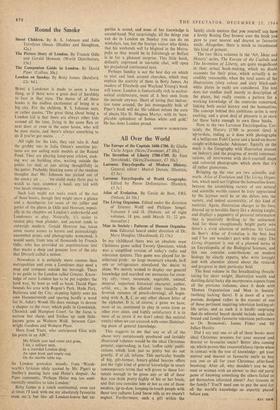Round the Smoke
London on Sunday. By Betty James. (Batsford, 12s. 6d.) BEING a Londoner is made to seem a brave thing, as if there were a great deal of hardship to face in that state. The theme of all these books is the endless excitement of being in a big city. For the children, B. S. Johnson says, or rather quotes, 'The great thing about being a London kid is that there are always other kids around all the time, living in the same flats or next door or even in the same house, who will be your mates, and there's always something to do if you've got mates. . .
All right for the kids, they can take it. And the grubby tots in Julia Oman's sensitive pic- tures are not sailing scale models at the Round Pond. They are playing lamp-post cricket, mak- ing war on building sites, waiting outside the public for dad, or just sitting thoughtfully in the gutter. Probably thinking some of the random thoughts that Mr. Johnson has picked out of the smoky air . . . 'we could make them pay to watch us race, sixpence a head, any kid with two heads ninepence. . .
Such kids might not make much of the rest of these books, though they might spare a glance and a thumbprint for some of the jollier and gorier of the plates in Odle and Howson, especi- ally in the chapters on London's underworld and Londoners at play. Naturally, it's easier to record play than plunder, and ancient tends to outweigh modern. Gerald Howson has taken some recent scenes to leaven and painstakingly assembled prints and photographs winnowed, it would seem, from tens of thousands by Francis Odle, who has provided an unpretentious text that masks a deep and genuine love of the city that Disraeli called a nation.
Nowadays it is certainly more cosmos than metropolitan and even a Londoner may need a map and compass outside his borough. There is no guide to the London called Greater. Know- ledge of outer London has to be put together the hard way, by boot as well as book. David Piper bounds his area with Regent's Park, Hyde Park, Battersea and the City, skipping lightly over his own Hammersmith and sparing hardly a word for St. John's Wood. He does manage to devote a chapter to the river, which pulls in Greenwich, Chiswick and Hampton Court. So the focus is narrow but sharp, and fetches 'up such little- known gems as Woburn Walk, between Cart- wright Gardens and Woburn Place.
Here lived Yeats, who anticipated Eliot with his poem in an ABC: My fiftieth year had come and gone, I sat, a solitary man, In a crowded London shop, An open book and empty cup, On the marble table top.
So London provokes moods, from - Words- worth's lyricism (duly quoted by Mr. Piper) to Shelley's passing hate and Heine's despair. As Piper comments, 'Perhaps Heine was too senti- mentally sensitive to take London.'
Betty James is a touch sentimental, even coy at times ('I took with me my absolutely favourite man, etc.'), but like all London-lovers her ex- x-
pertise is sound, and none of her knowledge is second-hand. Not surprisingly, all the things you can do in London on Sunday you can do on weekdays, too, but the foreign visitor who thinks that his weekends will be blighted in the Metro- polis as they would be in Edinburgh or Belfast is in for a pleasant surprise. This little book, defiantly expressed in tea-table chat, will open his prejudiced continental eyes.
Perhaps Sunday is not the best day on which to visit and look around churches, which may explain the scarcity of them in Betty James. As readers of Elizabeth and Wayland Young's book will know, London is fantastically rich in ecclesi- astical architecture, most of it best seen from the.outside anyway. Short of toting that instruc- tive •tome around, the just manageable bulk of Piper's book will do. He seldom misses the aura of places like St. Magnus Martyr, with its 'inex- plicable splendour of Ionian white and gold.' He has done London proud.
ANDREW ROBERTSON




























 Previous page
Previous page